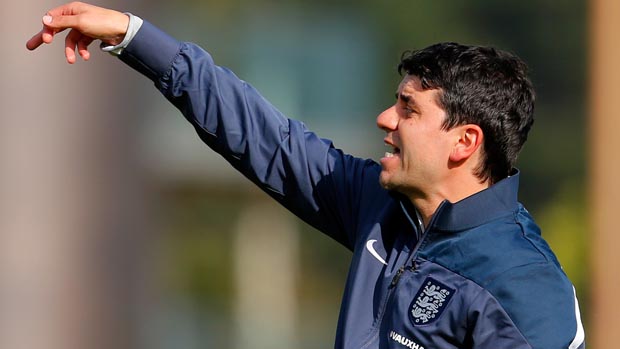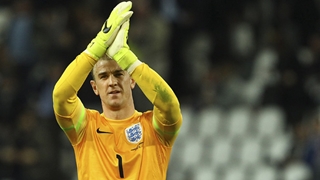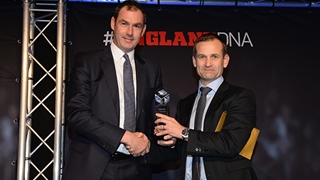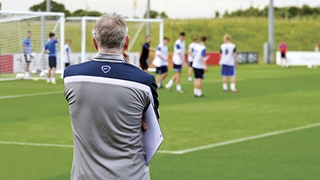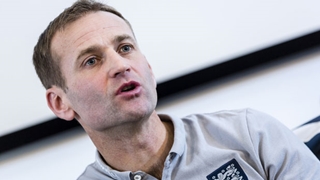
Aspiring generations of future England players are being encouraged to "Love the ball, love the game."
It's all part of the launch of new age-related guidelines designed to help coaches in their work with young players and provide a clear pathway for the development of future England internationals.
Rich Allen TID Conference 2015 Presentation
The England DNA age-phase priorities, which highlight the importance of 'staying on the ball and mastering the ball', 'exciting with the ball and seeking creative solutions', as well as 'Intelligent defending' and 'outwitting your opponent' have been launched at the four-day FA National Coaching Conference, England DNA: Connecting the game, which started at St George’s Park on Friday.
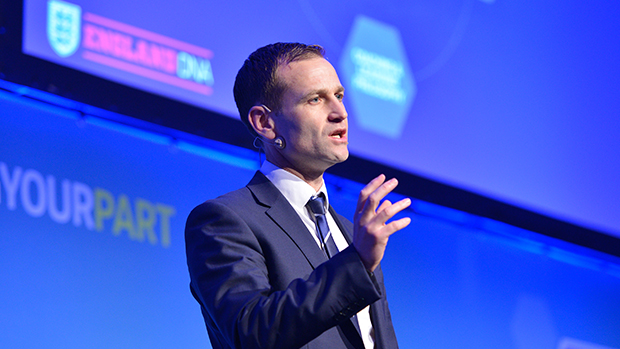
Ashworth outlined details of the England DNA age-phase priorities at Friday's launch of The FA National Coaching Conference
And FA technical director Dan Ashworth believes the nine headlines will help coaches at all levels of the game work more effectively with young players.
"Since launching the England DNA framework last December, we have worked in collaboration with the professional and grassroots game to establish some clear and simple guidelines for those working with young players in the three age-phases of youth development: 5-11 ; 12-16 ; 17-21," said Ashworth.
"We hope the England DNA age-phase guidelines – which you can learn more about through the new EnglandDNA.com website - provide ideas and inspiration for those that seek age-appropriate support for their work."
The development of the England DNA age-phase framework comes at the conclusion of the 12 month-long England DNA Leadership group which has seen FA technical staff working alongside experts from the professional and grassroots game as well as other sports, academia and research.
Ashworth has been enthused by the collaborative way of working.
"Encouragingly, the England DNA project has shown how different elements of the game and other sports and institutions can come together to share ideas and expertise on player development," he explained.
"We hope the launch of the guidelines will create further discussion and opportunities to collaborate with all those interested in this area," added Ashworth.
500 coaches are expected to continue the discussion about the importance of connecting each stage of a young player’s journey at this weekend’s annual coaching event.
Ashworth believes the best coaches working with young players have a clear view of the whole development journey.
"Whether your coaching role is to provide an enjoyable introduction to the game at the foundation phase or to expertly guide a 17-21 year old into the senior game – it is crucial to understand where the players in your care have come from and where they may go to next, tailoring your approach accordingly," explained Ashworth.
Pete Sturgess, FA Technical lead for the foundation phase, stresses that the development of future creative and technical players who can play the ‘England DNA way’ starts with the type of play encouraged with the very youngest players.
"Instead of players taking the easy option and playing the easy pass or kicking the ball out of play easily, we want coaches to say to young players ‘can you start something good for our team by staying on the ball and by trying to shield the ball and stay in possession’. We want to keep possession rather than surrendering it really cheaply," he explained.
It is an approach, echoed by Dan Micciche, FA Technical Lead for players 12-16, who also identifies intelligent defending as a key part to attacking more effectively.
"In order to play an expansive attacking style the players have to be prepared to defend 1v1 or maybe outnumbered and they need to be able to able to cope in those situations.
"One of the other headlines is ‘winning the ball cleanly’. So for example, when the ball is in the air and the defender goes up to head the ball they should be looking for a cushioned header into a midfield player or look to bring the ball down on their chest, as opposed to heading the ball off the pitch."
Alongside the focus on intelligent play, FA Technical Lead 17-21 Neil Dewsnip, stresses that core defending techniques haven’t been forgotten.
"We still have to develop an attitude that the players want to defend. Equally as important are the skills of defending the goal which is crucial at every stage along a young players journey," explained Dewnsip.
The FA National Coaching conference England DNA: Connecting the game takes place on 4-7 December at St George’s Park.
The four-day conference will explore how to connect each stage of a player’s development journey in order to provide a positive experience of the game.
To learn more about the England DNA and the age-phase priorities visit www.EnglandDNA.com
Follow @StGeorgesPark for highlights from the conference.

